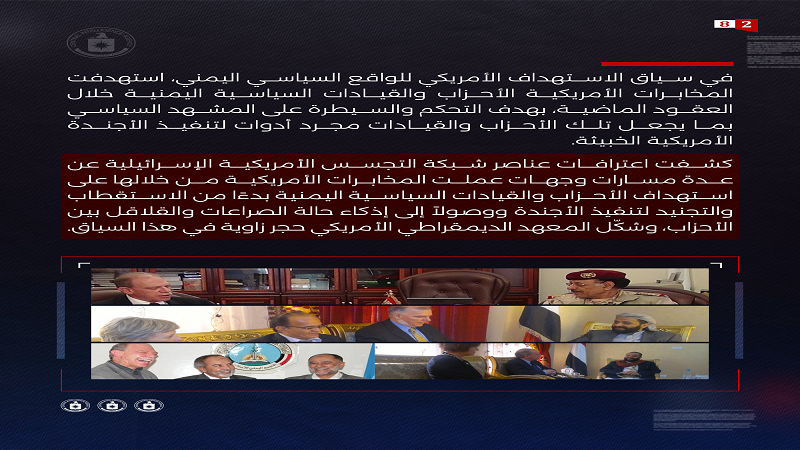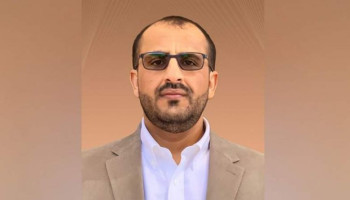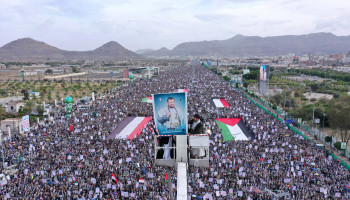Yemen has experienced a bitter political struggle for many years, with the traitor Ali Abdullah Saleh remaining in power, dominating all aspects of political life in the country.
During this time, the U.S. administration found numerous opportunities to infiltrate Yemen’s political reality, using every means to turn Yemen into a region under American influence, thereby violating its sovereignty.
The confessions of the American-Israeli spy network reveal aspects of this American targeting of Yemen's political landscape, particularly focusing on the period before the February 2011 revolution.
Control of the Supreme Commission for Elections
Spy Shaif Al-Hamdani stated, "From the beginning, the democracy sector worked to determine the president who would lead Yemen by supporting the presidential elections and controlling the Supreme Commission for Elections."
Regarding the election program, spy Abdul Mu'in Azzan, who worked at the National Democratic Institute (NDI), said that the program was managed by a Yemeni expert named Murad Zafar. Outwardly, the program appeared to provide technical support to political parties regarding elections, participation, voter targeting, etc., as well as technical support to the Supreme Commission for Elections and Referendum. However, it had an intelligence role, covertly recruiting party leaders interested in elections. The U.S. Embassy and intelligence aimed to obtain the electoral register of Yemeni citizens under the pretext of digitizing the paper-based register.
Shaif Al-Hamdani also mentioned that USAID worked with various embassy offices, including during the presidential elections between Ali Abdullah Saleh and Faisal Bin Shamlan. He was part of the team composed of different embassy sections, led by Brad Hansen, tasked with monitoring the Supreme Commission for Elections to ensure that the election process proceeded as the U.S. desired, particularly focusing on electoral districts with significant voter turnout, which would determine the election winner. Brad Hansen’s efforts were geared towards ensuring Ali Abdullah Saleh’s victory.
The Political Parties Program and Recruitment of Party Leaders
Spy Abdul Mu'in Azzan recounted that he indirectly worked for U.S. intelligence through Murad Zafar, who was then a program director. Zafar trained Yemeni employees for future work with U.S. intelligence, hosting sessions where he instructed on recruitment, information gathering, and relationship building.
He added that the parties program, managed by a Serbian expert named Sasha Psevic, seemingly supported Yemeni political parties and leaders but in reality, recruited party and political leaders for U.S. intelligence. It also convinced political parties that the U.S. Embassy was the arbiter of Yemen’s political process.
Shaif Al-Hamdani revealed that U.S. intelligence supported specific individuals in particular political parties to strengthen those parties. Every party and figure sought to build a relationship with the U.S., with notable figures like Dr. Yassin Saeed from the Yemeni Socialist Party, Abdul Malik Al-Mikhlafi from the Nasserist Party, and Abdul Wahab Al-Ansi from the Yemeni Congregation for Reform being close friends of the U.S. Embassy.
Al-Hamdani also mentioned a close relationship between General Ali Mohsen Al-Ahmar and the U.S. Embassy, particularly with Ambassador Feierstein, who frequently visited him. The embassy's overall goal was to create discord among political parties, with the U.S. playing a role in ensuring continued political instability.
The Parliament Program and Recruitment of Parliamentarians
Azzan also described his work at the NDI, particularly in the Parliament Program, where he assisted the Canadian program director in monitoring parliamentary sessions, summarizing them, and establishing contacts with MPs on behalf of the program director. He provided valuable information about the emerging Houthi movement at the time.
He eventually became responsible for the Parliament Program, recruiting MPs through workshops and personal invitations, with one such MP providing significant information about Yemen's oil sector, which was then relayed to U.S. officials. Azzan noted that the U.S. Embassy cultivated relationships with influential MPs, sending them to the U.S. for training under the International Visitor Leadership Program, ensuring they supported American interests in Yemen.
Prominent MPs with strong U.S. ties included Sultan Al-Barakani, Sakhr Al-Wajeeh, and Mohammed Ali Al-Shaddadi, with meetings held at Al-Shaddadi’s home and direct contacts with U.S. political officers.
Recruitment of the Opposition
Shaif Al-Hamdani explained how U.S. intelligence targeted the Yemeni opposition, inviting them to embassy events and sending them on exchange visits to the U.S. The goal was to build relationships, making these individuals sources of information for the U.S. The embassy invested heavily in various sectors, including the judiciary, political opposition, civil society organizations, the media, law, academia, and universities, all aimed at furthering U.S. influence in Yemen.
Months ago, Yemeni Security Forces announced they dismantled a significant espionage network working for the United States and Israel, involved in espionage and sabotage activities across various state institutions for decades.
According to a statement from the Security Forces, the network was directly linked to the US Central Intelligence Agency (CIA) and obtained susceptible information about various aspects of life in Yemen, including military, security, economic, agricultural, health, and educational fields.







